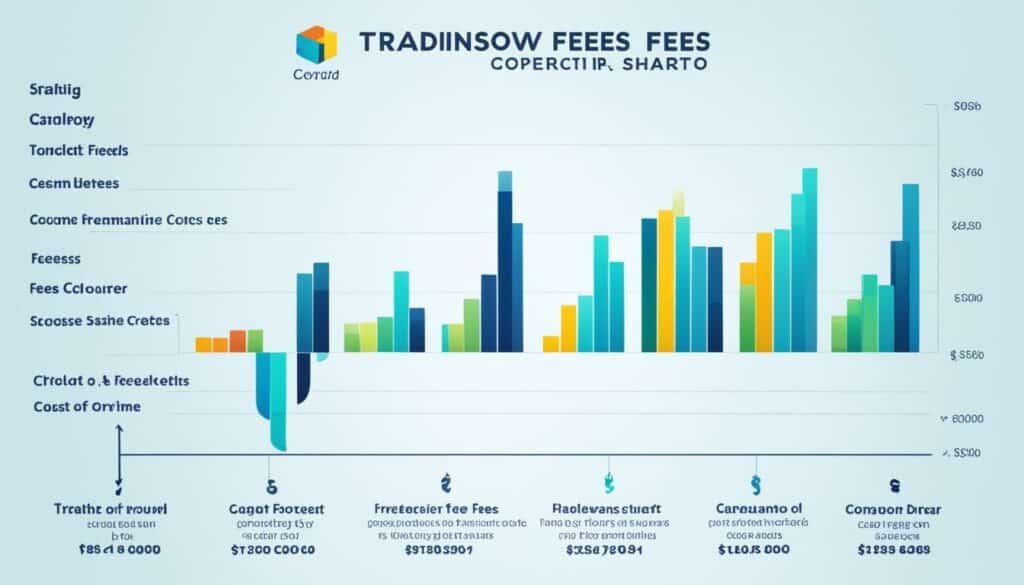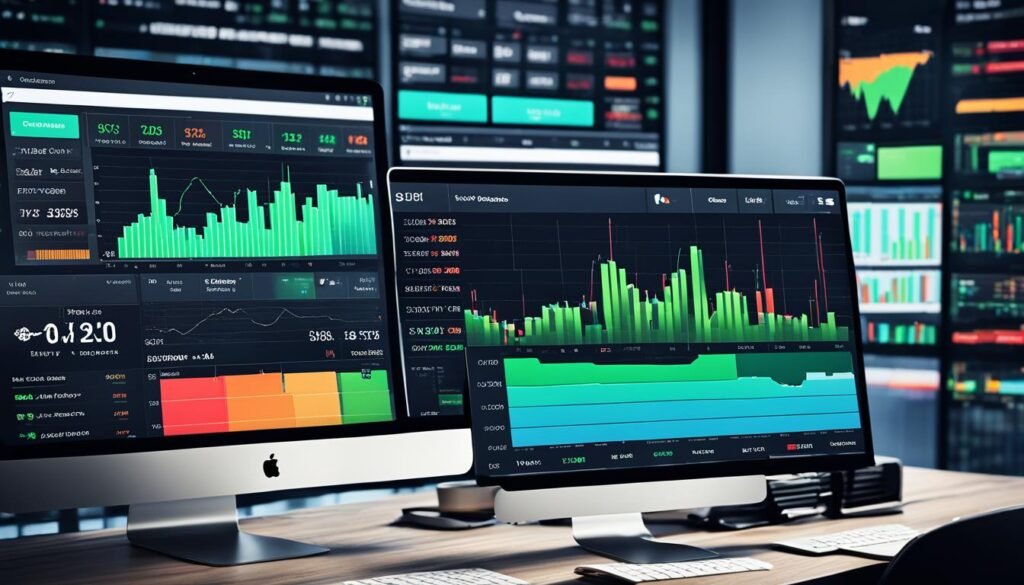Online stock trading platforms have revolutionized the way people invest, offering a convenient and efficient way to buy and sell stocks. These platforms provide access to the financial markets and are offered by various discount brokers operating through online platforms. Choosing the right online broker is crucial for successful investing, as it can make a significant difference in the investment experience and results.
Key Takeaways : Online Stock Trading Platforms
- Online stock trading platforms have transformed investing, providing easy access to financial markets.
- Choosing the right platform is essential for a successful investment experience.
- Online brokers offer various trading platforms with different features and fees.
- Consider your investing goals and needs when selecting a trading platform.
- Research and evaluate different brokers to find a reputable provider that meets your requirements.
Step 1: Know Your Needs
Before beginning your search for an online stock trading platform, it is important to understand your own investing goals and where you are in your investment learning curve.
Consider whether you are an active or passive investor, what types of trades you want to execute, the level of help you need, and your overall investing goals. By determining your needs, you can better evaluate which trading platform features will be most important to you.
Evaluating Your Investing Goals
Before selecting a trading platform, take the time to clearly define your investing goals. Are you investing for long-term growth, or are you looking for short-term gains through active trading? Are you focused on stocks, or do you want to explore other investment options like options or futures?
Understanding your goals will help you identify the features and tools that are essential for your trading platform. For example, if you are a beginner looking to learn more about investing, you may need access to educational resources and tutorials. On the other hand, experienced traders may prioritize advanced charting tools or real-time streaming quotes.
Navigating the Investment Learning Curve
Consider where you are in your investment learning curve. If you’re just starting out, you may prefer a platform that offers a user-friendly interface and educational resources to help you navigate the complexities of the stock market. As you gain more experience and knowledge, you may desire a platform that provides advanced analytics and research tools.
Take into account your comfort level with technology and financial concepts. If you prefer a simple and intuitive platform, look for trading platforms that are designed for beginner investors. However, if you’re a seasoned investor looking for more customization and control, a platform with robust features and advanced trading tools may be a better fit.
Also Read: The Financial Playbook: Winning Strategies For Business Finance Excellence
Identifying Key Trading Platform Features
Once you understand your investing goals and where you stand in your investment learning curve, you can evaluate which trading platform features are most important to you.
Consider the following features:
- Real-time streaming quotes
- Advanced charting tools
- Risk management tools
- Order execution capabilities
- Portfolio tracking and analysis
Table: Comparison of Trading Platform Features
| Trading Platform | Real-time Streaming Quotes | Advanced Charting Tools | Risk Management Tools | Order Execution Capabilities | Portfolio Tracking and Analysis |
|---|---|---|---|---|---|
| Platform A | Yes | No | Yes | Yes | Yes |
| Platform B | Yes | Yes | Yes | Yes | No |
| Platform C | Yes | Yes | No | No | Yes |
By considering your investing goals, investment learning curve, and desired trading platform features, you can make an informed decision when selecting the right online stock trading platform for your needs. In the next section, we will focus on narrowing down your options based on important factors such as stock broker regulation, online security, and brokerage account offerings.
Step 2: Narrow the Field
Once you have identified your needs, it is time to narrow down your options. To make an informed decision, consider important factors such as stock broker regulation, online security, and brokerage account offerings. These factors play a crucial role in ensuring a safe and reliable trading platform.
When evaluating stock broker regulation, look for brokerages that are members of reputable organizations such as the Securities Investor Protection Corporation (SIPC) and the Financial Industry Regulatory Authority (FINRA). These memberships signify that the brokerages adhere to industry regulations and investor protection measures.
Also Read: From Concept To Execution: Navigating The Complex Journey Of Possible Finance Transformation
Online security is another vital aspect to consider when selecting a trading platform. Ensure that the platform provides robust security measures to protect your account information and transactions. Look for features such as two-factor authentication, encryption, and secure socket layers (SSL) to safeguard your sensitive data.
Alongside stock broker regulation and online security, pay attention to the offerings of the brokerage account. A comprehensive brokerage account should provide a variety of products and account types to meet your investment needs. Consider factors such as retirement accounts, managed accounts, and the availability of different asset classes.
To summarize, when narrowing down your options, prioritize stock broker regulation, online security, and the range of offerings provided by the brokerage account. These factors will help you select a trusted and secure platform that aligns with your investment goals.

Table: Key Factors to Consider When Narrowing Down Trading Platform Options
| Factors | Importance |
|---|---|
| Stock broker regulation | High |
| Online security | High |
| Brokerage account offerings | Medium |
Step 3: Figure Out the Fees
When it comes to choosing a trading platform, the fees associated with the platform are a crucial consideration. Different platforms have varying fee structures, and finding one that aligns with your trading strategy is important for long-term success.
First and foremost, you need to determine your trading strategy. Are you an active trader who frequently buys and sells stocks, or are you more focused on long-term investing? This will help you figure out whether you prefer low fees for frequent trading or are willing to pay higher fees for more features and tools.
Also Read: How Do Finance Charges Affect My Credit Score?
It’s also essential to research the reputation of the platform provider. Look for a provider that has a solid track record and is known for supporting the features they offer. This will give you confidence that the platform will meet your needs and provide a reliable trading experience.
To help you assess the fees of different trading platforms, consider creating a comparison table. This table can outline the fee structures and features of various platforms side by side, allowing you to make an informed decision based on your trading strategy and overall goals.
Here is an example of a comparison table:
| Platform | Fee Structure | Key Features |
|---|---|---|
| Platform A | Low fees per trade | Advanced charting tools, real-time market data |
| Platform B | Higher fees with additional features | Access to research reports, customizable watchlists |
| Platform C | Fixed monthly subscription fee | Unlimited trades, educational resources |

Remember, choosing a trading platform is a decision that can have a significant impact on your trading journey. Take the time to assess the fees, consider your trading strategy, and research the provider’s reputation to find the best platform for your needs.
Also Read: Beyond Education: Roosevelt University Role In Empowering Communities
What Is a Trading Platform?
A trading platform is a software system used to trade securities. It allows investors to open, close, and manage market positions online through a financial intermediary, typically an online broker. Trading platforms provide investors with access to the financial markets, offering a convenient and efficient way to buy and sell stocks, currencies, options, or futures.
These platforms offer a range of features that cater to different levels of trading expertise. For beginners, trading platforms often have basic order entry screens that simplify the process of placing trades. They also provide real-time streaming quotes, allowing investors to monitor market movements and make informed decisions. Advanced charting tools are available for technical analysis, helping traders identify trends and patterns in the market.

Trading platforms also offer access to live news feeds and proprietary research, providing investors with valuable information to stay updated on market conditions and make well-informed trading decisions. These platforms may also offer educational resources, including tutorials, webinars, and trading courses, to help investors enhance their trading skills and knowledge.
The market access provided by trading platforms enables investors to trade in different markets, depending on their preferences and investment strategies. Whether it’s stocks, currencies, options, or futures markets, trading platforms offer the necessary tools and functionality to execute trades efficiently.
Also Read: The Role Of Technology In Enhancing Security Finance Operations
Overall, trading platforms play a crucial role in empowering investors with the tools they need to navigate the financial markets. By leveraging these platforms, investors can take advantage of various trading tools, access real-time market data, and execute trades swiftly and securely.
Understanding Trading Platforms
When it comes to trading platforms, there are two main types: commercial platforms and proprietary platforms. These platforms cater to different types of investors, including day traders and retail investors.
Commercial platforms are designed with the needs of day traders and retail investors in mind. They provide user-friendly interfaces that make it easy for users to navigate the platform and execute trades. Real-time quotes, news feeds, interactive charts, educational content, and research tools are also available to help traders make informed investment decisions.
On the other hand, proprietary platforms are developed by large brokerages and financial institutions for their own trading activities. Unlike commercial platforms, proprietary platforms are not available to the public. They are customized according to the specific needs and strategies of the institution and are typically used by professional traders.
For day traders and retail investors, commercial platforms offer a range of features and tools that can enhance their trading experience. These platforms provide real-time market data, allowing users to stay updated on the latest price movements and news that can impact their investments. Interactive charts and technical analysis tools help traders analyze market trends and make informed trading decisions.
Educational content and research tools are also valuable resources provided by commercial platforms. These resources can help traders learn more about different trading strategies, understand market dynamics, and access research reports and analysis from experts in the field.
Example of a Commercial Trading Platform
One example of a popular commercial trading platform is E*TRADE. E*TRADE’s platform offers a user-friendly interface with real-time quotes, interactive charts, customizable watchlists, and a wide range of educational materials. Retail investors and day traders can easily navigate the platform and execute trades efficiently.
Commercial platforms are designed to meet the needs of day traders and retail investors, providing the tools and features necessary to make informed investment decisions. These platforms play a crucial role in empowering individuals to actively participate in the financial markets and take control of their investment portfolios.
| Commercial Trading Platforms | Key Features |
|---|---|
| E*TRADE | User-friendly interface |
| Real-time quotes | |
| Interactive charts | |
| Customizable watchlists | |
| Educational materials |

Special Considerations
When choosing a trading platform, there are several special considerations that can help you make an informed decision. Consider the following factors to ensure the platform aligns with your trading needs:
Trading Platform Features
Take into account the specific features offered by the trading platform. Different types of traders may require different features. For example, day traders may need advanced features like Level 2 quotes and access to market depth information, while options traders may need tools specifically designed for options trading. Assess your trading style and strategy to determine which features are essential for your success.
Trading Fees
Another crucial factor to consider is the trading fees associated with the platform. Different platforms may have varying fee structures, and it’s important to find one that aligns with your trading strategy. Evaluate whether you prefer low fees for frequent trading or more features and tools for a higher fee. It’s essential to consider how trading fees will impact your overall return on investment.
Intermediary Reputation
Before committing to a specific trading platform, it’s important to carefully evaluate the reputation of the intermediary or broker. A reputable intermediary should have a solid track record and be able to support all the features they offer. Look for trusted, well-established intermediaries that have gained a positive reputation within the trading community. Online reviews and recommendations from other traders can help you assess an intermediary’s reputation.
By considering these special considerations, you can ensure that the trading platform you choose caters to your specific trading needs, offers competitive fee structures, and is backed by a reputable intermediary or broker.
Popular Trading Platforms
When it comes to online stock trading, there are numerous platforms available in the market to meet the diverse needs of investors. Each platform offers unique features and advantages, catering to different trading styles and strategies. Let’s take a closer look at some of the most popular trading platforms:
Interactive Brokers
One highly regarded platform for advanced traders is Interactive Brokers. Known for its low fees and access to markets worldwide, Interactive Brokers offers a robust trading environment with a wide range of tools and resources. It is particularly favored by experienced traders looking for global market exposure and advanced trading capabilities.
TradeStation
TradeStation is a popular choice among algorithmic traders. With a focus on automated trading strategies, TradeStation offers advanced technological capabilities and customizable features. Traders can take advantage of its powerful charting tools, backtesting capabilities, and extensive historical data to develop and execute complex trading strategies.
TD Ameritrade
TD Ameritrade, especially after its acquisition of thinkorswim, has become a popular platform for both traders and investors. It offers a wide range of trading tools and features to assist investors of all levels. With its user-friendly interface, extensive educational resources, and access to a diverse selection of investment products, TD Ameritrade is a preferred choice for many.
Robinhood
Robinhood is a commission-free trading platform that has gained popularity, particularly among millennials. With its easy-to-use interface and zero-commission trades, Robinhood has attracted a large user base. While it may not offer as many advanced features as other platforms, it provides a simple and accessible trading experience.
MetaTrader
MetaTrader is a widely used trading platform in the forex market. It offers a comprehensive suite of tools and resources specifically tailored for currency trading. MetaTrader provides real-time quotes, advanced charting capabilities, and the ability to execute trades across multiple currency pairs. Its popularity stems from its extensive analytical tools and the availability of expert advisors for automated trading strategies.
Choosing the right trading platform is essential for a successful investing experience. Each platform offers unique features and benefits, so it’s important to consider your trading goals, preferences, and requirements when making a decision. Whether you’re an advanced trader looking for global market access or a beginner seeking simplicity, there is a trading platform out there to suit your needs.
Full-Service vs. Discount Stock Brokers
When it comes to choosing a stock broker, investors have the option of selecting either a full-service stock broker or a discount stock broker. Each type of broker comes with its own set of advantages and considerations, particularly in terms of the services and fees they offer.
Full-Service Stock Brokers
Full-service stock brokers provide a comprehensive range of services beyond just buying and selling stocks. They often offer extensive financial planning, retirement planning, investment advice, and other personalized services. These brokers take a hands-on approach to managing their clients’ portfolios and provide guidance to help investors make informed decisions about their investments.
However, it’s important to note that full-service brokers typically come with higher fees and transaction costs compared to discount brokers. These fees can eat into an investor’s returns, especially for those who trade frequently or have smaller investment portfolios.
Discount Stock Brokers
Discount stock brokers, on the other hand, offer online buying and selling of investments at lower trading commissions and fees. They provide a self-service approach, allowing investors to execute trades independently without the need for extensive financial guidance.
By eliminating the personalized services provided by full-service brokers, discount stock brokers are able to offer lower fees and commission rates. This can be particularly advantageous for investors who prefer a more hands-on approach to managing their investments and are comfortable making their own investment decisions.
However, it’s important to consider that discount stock brokers may have fewer research resources and educational tools compared to their full-service counterparts. Additionally, investors who require extensive financial advice or personalized services may find discount brokers lacking in these areas.
Choosing the Right Option
Choosing between a full-service stock broker and a discount stock broker ultimately depends on an investor’s individual needs and preferences. Those who value personalized services, professional advice, and are willing to pay higher fees may opt for a full-service broker. On the other hand, investors who prefer a more independent approach to investing and are cost-conscious may find discount stock brokers to be a better fit.
In order to make an informed decision, investors should carefully weigh the services offered, fees charged, and consider their own investment goals and preferences. It can be helpful to evaluate the specific services provided by different brokers, compare fee structures, and consider the level of guidance and support required.
Ultimately, the choice between a full-service stock broker and a discount stock broker is a personal one that should be based on an investor’s individual needs, investing style, and financial goals.
| Full-Service Stock Brokers | Discount Stock Brokers |
|---|---|
| Comprehensive range of services | Lower trading commissions and fees |
| Financial and retirement planning | Self-service approach |
| Investment advice and guidance | Limited research resources |
| Higher fees and transaction costs | No personalized services |
In April 2024, finding the best online brokerages and trading platforms is crucial for beginners looking to start trading stocks and ETFs. With many brokers offering commission-free trading and fractional share trading options, it’s essential to choose the best online broker that suits your investment needs. Interactive Brokers, TD Ameritrade, and other top online brokers offer advanced trading tools, making them ideal for active traders.
Additionally, beginners can benefit from brokers that provide user-friendly trading apps and educational resources to help them navigate the stock market. Whether you’re interested in options trades, futures trading, or margin trading, selecting the best online brokerage account can set you on the right path for successful investing in 2024.
In April 2024, the best brokerage accounts and trading platforms are essential for traders aiming to optimize their trading experience. Whether you prefer full-service brokers or want to pick the best online broker for yourself, comparing the best online brokerage accounts is crucial. These platforms offer robust trading technology, powerful trading tools, and easy-to-use trading interfaces, allowing you to start trading immediately with confidence.
With features like paper trading, direct stock purchase plans, and cryptocurrency trading, top online brokers cater to a variety of trading strategies. They also provide competitive best for active commissions on stock and ETF trades, as well as fees for options trading. From traditional brokers to online brokerage platforms, the best online brokers offer a full range of services to meet your trading needs. With user-friendly trading platforms and robust trading
Also Read : BMW Finance Options – Get Your Dream Car Now!
Conclusion
Online stock trading platforms have revolutionized the way people invest, providing easy access to financial markets and a wide range of trading tools. By choosing the right platform that aligns with your needs, you can enhance your investment experience and potentially improve your investment returns.
To make the best decision, it is important to consider your investing goals. Are you an active or passive investor? What types of trades do you want to execute? By understanding your needs, you can research different platforms and evaluate their fees and features to find the one that suits you best.
Remember to choose a reputable provider that offers a seamless online stock trading experience. With the benefits of online stock trading platforms, you can take control of your investments, trade with confidence, and potentially achieve your financial goals.
FAQs
Q: How does online stock trading work?
A: Online stock trading platforms allow investors to buy and sell stocks, ETFs, and other securities through an online brokerage account. Investors can place orders, track investments, and manage their portfolios online.
Q: What are some key features to look for in the best online broker?
A: When choosing the best online broker, consider factors like trading fees, account minimums, available investment options, research tools, customer support, and ease of use of the trading platform.
Q: How can beginners start trading stocks online?
A: Beginners can start trading stocks online by opening an online brokerage account, researching different brokers, learning about investment strategies, and practicing with a virtual trading account before investing real money.
Q: What are the best online trading platforms for April 2024?
A: The best online trading platforms for April 2024 offer advanced trading tools, research resources, competitive pricing, user-friendly interfaces, and access to a wide range of financial markets.
Q: What are some advantages of using online brokers and trading platforms?
A: Online brokers and trading platforms offer convenience, 24/7 access to markets, lower fees compared to traditional brokers, a wide range of investment options, and tools for analysis and research.
Q: How do online brokerage accounts work?
A: Online brokerage accounts provide a platform for investors to buy and sell securities online. Investors can fund their accounts, place trades, monitor investments, and access research tools and resources through the brokerage platform.
Q: What are fractional shares and how are they traded?
A: Fractional shares are partial shares of a company’s stock that allow investors to invest in high-priced stocks with smaller amounts of money. Fractional shares are typically traded through online brokers that offer this feature.








